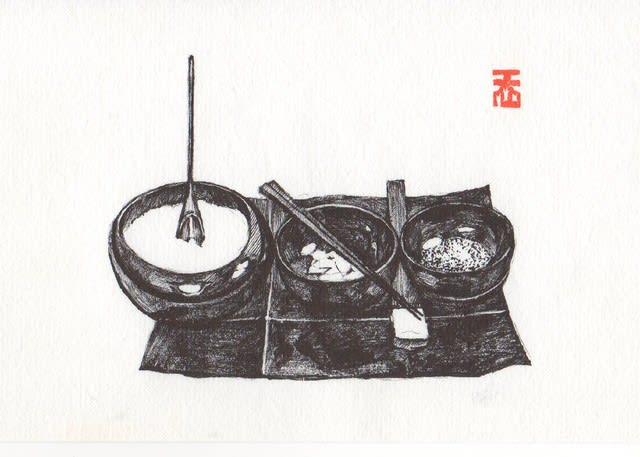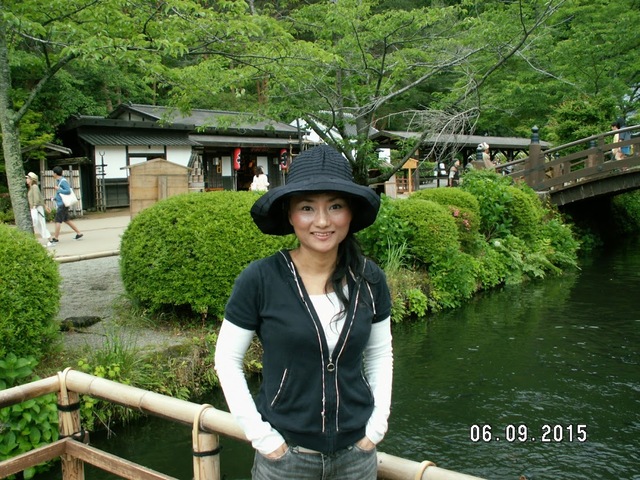立つ鳥後を濁さずという日本の諺がある。
There is a Japanese proverb that
a bird does not foul the nest when it is about to leave.
その意味は、
ある者が、自分がいた場所を立ち去る際に潔く、
キレイに後始末をすることを指す。
The representing means
when someone leaves from the place where has been,
the one prudently cleans up the place as things all in order.
木の枝で暫くいた鳥が、
その枝から飛び去ってからも、
その鳥がいた痕跡が何も残っていないことに例えられ、
自分が使った痕跡を何も残さない思いやりを表す。
It shows an example that
a bird stayed for a while on a branch
and when after it flew away,
there is no trace left behind
and representing one’s considerateness that
leave nothing to trace how used objects at the place.
この諺の奥には
礼儀作法に対する基本姿勢が表れていて、
人が公共の場で共有物を使った後ですべきことを指示してもいる。
The proverb deeply indicates the basic stance of manners
and pointing what people should do
when after using co-shared objects in public.
私は礼儀作法について
学びたい欲求が一際強かったが、
学校の授業では指定された礼儀に関する科目が無かった。
I pretty eagerly wished to learn
about proprieties and a good manner
but there was no curriculum at school
related with courtesy as a designated subject.
礼儀作法に従って行いを正すことは
望ましいことだと分かってはいたが、
どうやって作法を行うかについて
教えてもらえたことが無かった。
Although my understanding of rectifying behaves
followed by rule of manners was desirable,
but I have not taught how to perform etiquette.
だが、8年前の坐禅体験会で、
ついに、念願した食事作法と坐禅作法について
とことん教えてもらえることに至ったのであった。
But 8 years ago at a zazen practicing group,
the chance finally came to me for learning strictly
about the real table manners
and zazen practicing manners
as my wished way to gesture righteously.
その坐禅会では、
食べる時の姿勢、
食事の際の箸の置き方と戻し方、
器の持ち方、
料理を頂く方法と断る方法、
食事前後の礼の行い方などの
厳格な指導を受けることができた。
At the zazen practicing group,
I was able to take instructions in strict ways that
the posture when eat,
how to put chopsticks and how to put back while eating,
how to hold bowls,
how to take foods and how to refuse,
how to perform courtesy before meal and after.
道場では音をたてないことになっていたので、
食べる時も咀嚼の音を立てずに食べたのだが、
それだけは思ったほど難儀ではなかった気がする。
At the practicing place,
we trainee should not make any sounds when we eat
so, I had to eat without making chewing sounds,
but it was the only train menu for me to excuse
and also it was not as hard as I expected.
私がそのように食事作法を習ったとしても
その作法をそっくり現生活でも行うことは中々難しいが、
修行僧は実際、その作法を毎日おこなっているのだから、
修行増にとっては作法が特別な行動でなく
日常の一環であるようだ。
Even though I learned such strict table manners,
it will be quite difficult for me to do manually in daily life,
if I have to do as I was taught.
However,the trainee priests are actually doing the propriety every day,
so it must be one of their routines as a practitioner
and their practicing seemed not a special action.
その修行僧のように
作法を日常の一課として熟していけば、
作法が身に付き意識せずとも自然に行えるだろう。
If someone does propriety as a routine
and founded to be mature as the way a trainee priest does,
the one will be able to perform the propriety naturally
without conscious and it will make a good behave.
作法やマナーも
特別な行事での特定した態度だけに限定せず、
毎日の日常で行えば
その人の動作や仕草にも良い姿勢として
やがては現れるようになるだろう。
If someone accuses such propriety and manners in daily life
and try not to limit for special attitudes
or specified events to show,
then the manners will be accustomed eventually
as the one behaves or gestures.
もう8年も前に習ったその食事作法の
箸を置く角度や箸を手で持つ寸法などは
すっかり忘れてしまったが、
『決まった決まりがきちんとある』
このことだけは基本として記憶に残っている。
I completely forgot those details that
I learned 8 years ago,
such as how to put chopsticks with righteous angle
or righteous measurement when hold the chopsticks
for table manners,
but the basic concept of
“There must be a properly determined rule”
is still in my memory.
また、気が緩んで楽に食事をしたい時にも
あの時に習った厳しい訓練が甦ると
姿勢を正すことにしている。
Also, when my mind loosens and just take an easy when I eat,
I make myself sure that the strict training I learned
and try to straighten my posture.
一人リラックスしている時でも
だらしなく楽になることだけをせず、
できるだけ習ったことを実行するようにしているのも
訓練のおかげかなと思ったりする。
When I am alone even it is relaxing time for me
I try not to be untidy and just to be cozy,
I am trying to practice as possible as I can
to excuse the learning,
those efforts I try to do must be resulted from
the training I always appreciate for.
『立つ鳥、後を濁さず』
に現れている人がいたある場所を去る時、
まるでそこにその人がいなかったように
そこいた痕跡を残さない。
“A bird about to fly away, no turbulence left behind”
this proverb representing that
a person leaves from where oneself has been,
the one left nothing to trace as if the one never been there.
この諺は私が作法の細かい手順を忘れた時でも、
どう作法を行うかの基本の定めや決まりを教えでくれる。
This proverb teaches to me that
even when I forgot detailed procedure of manners,
it gives me clue to find
such as the basic regulation and rules
how to perform courteously.
Reference link:「威儀即仏法、作法是宗旨」
https://s.webry.info/sp/oryouridaisuki.at.webry.info/201604/article_28.html
























